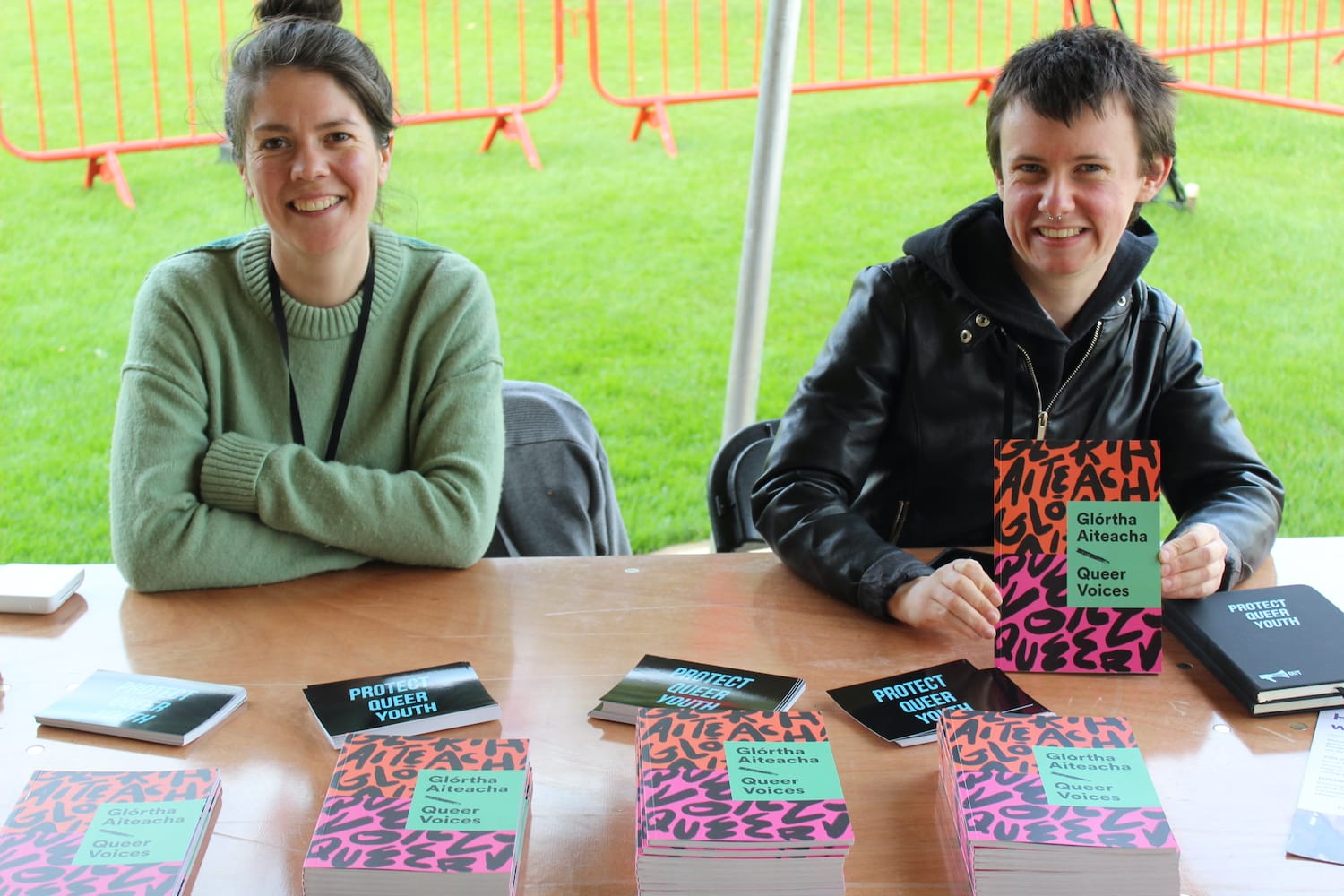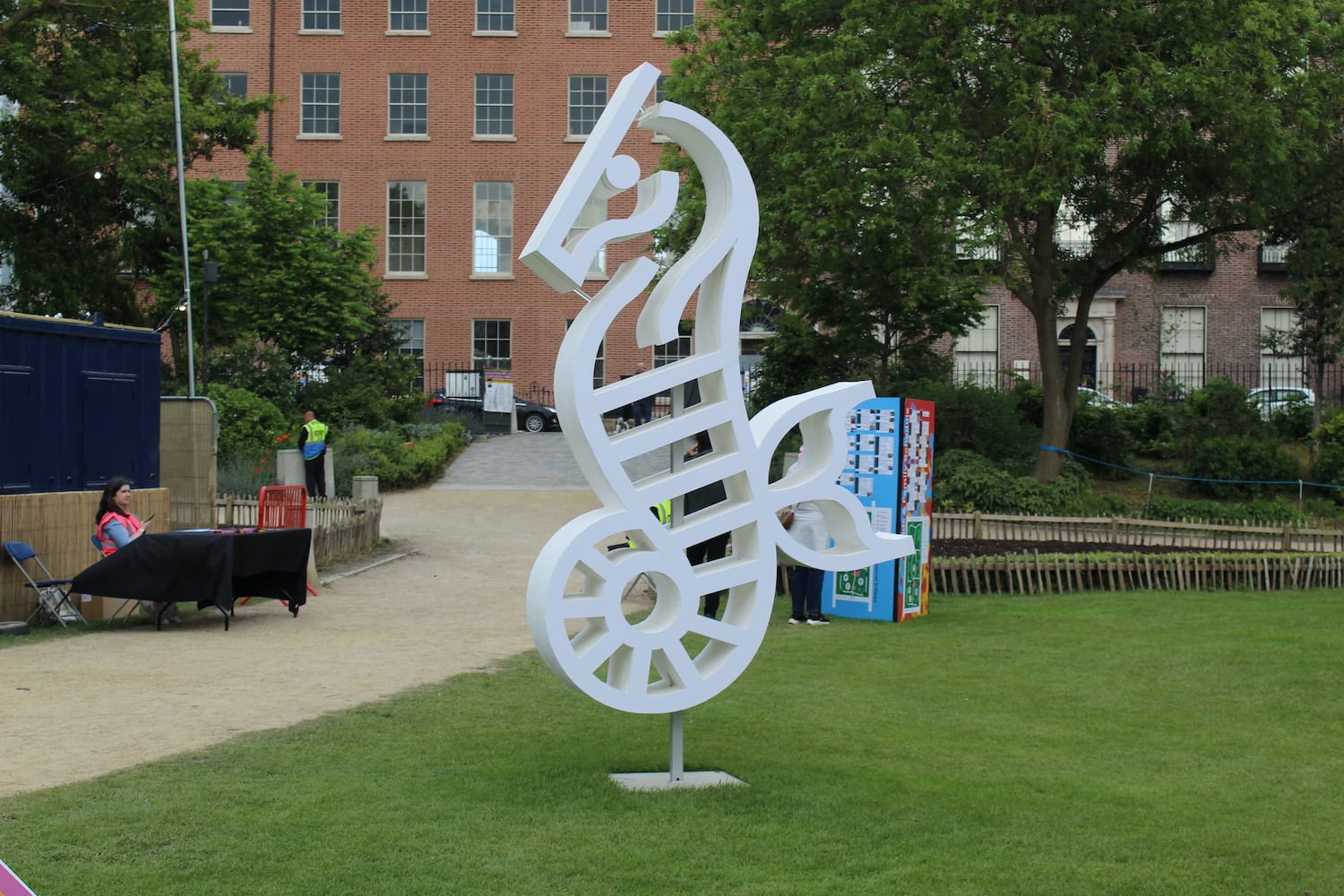What’s the best way to tell area residents about plans for a new asylum shelter nearby?
The government should tell communities directly about plans for new asylum shelters, some activists and politicians say.
On a recent Monday, contributors to the new collection Glórtha Aiteacha \ Queer Voices shared readings to celebrate pathways, often through struggle, to joy and community.

Under an off-white tent in the middle of Merrion Square park, a crowd sits in rows of dark grey fold-up chairs.
On a raised stage set up in front, Lisa Nic an Bhreithimh speaks into the microphone on her headset. A few minutes earlier, a burst of evening sunshine had cut through the clouds above.
“I want to tell you that you’ll be okay,” she says, reading from her essay “Grá agus Pobal – Love and Community”.
“I hope I’ll be right,” she says. “It’s not always the way for all of us, but I hope it is for you.”
Nic an Bhreithimh, an activist, commentator and campaigner, wrote the piece for the collection Glórtha Aiteacha \ Queer Voices, a bilingual celebration of “queer resilience, joy, and community”.
Glórtha Aiteacha \ Queer Voices was launched in February 2023 as a support for LGBTQ+ youth.
On 22 May, live readings and conversations with select authors from the book were staged as part of the International Literature Festival Dublin.
Outside the tent are benches and brightly-coloured deck chairs, coffee stalls and music.
As Nic an Bhreithimh reads, a young father plays football with his son on the grass. A light breeze passes through the tent.
The crowd is silent. Nic an Bhreithimh flows between Irish and English.
She talks about discovering her sexuality. “I needed to explore more, to date other people […] Bhí mé ag cinnte go raibh rud éigin le fiosrú. Ní raibh mé cinnte céard a bhí ann.”
Writer and activist Ciara Ní É, dressed in a stylish pale lavender trouser suit, moderates readings and conversations with the writers.
“Just a few years ago,” she says before proceedings begin, “I couldn’t have imagined such a melding of the Irish language and queer culture.”
Ní É runs a queer arts collective in which everyone speaks Irish.
The hope is to show how queer Irish people have always existed, she says. “And that our queerness and being Gaelic or Irish are not at odds with each other.”
Tilly Taylor is the training and development manager with ShoutOut, the Irish LGBTQ+ charity that published the book. She is running a stand at the back of the tent with Ollie Bell, stacked with copies of it.
It was important for Glórtha Aiteacha \ Queer Voices to represent the identities and experiences that ShoutOut meet in their volunteer pool and wider community, says Taylor, via email.
“It was also important that it contained a diversity of styles, genres, and creative offerings,” she says.

Taylor adds that there is a persistent thread running throughout the book: “The perspective of LGBTQ+ people who struggled growing up, but found pathways to community, self-realisation, and resilience.”
Contributor Vickey Curtis, a spoken-word artist, sits with Nic an Bhreithimh and Ní É on stage.
She talks about her Dublin Fringe show GAA MAAD back in 2019. It was all about “being gay and loving the GAA”, she had said earlier.
“We don’t see enough representation of gay people within the GAA,” Curtis tells attendees. “You see the Confederate flag in Croke Park but you don’t see the Pride flag.”
The event landed on the eighth anniversary of the marriage-equality referendum. It was not lost on attendees.
Yet a report published by An Garda Síochána in March 2023 said there had been a 29 percent increase in reported hate crimes and hate-related incidents in Ireland in 2022, compared to the year prior – and that LGBTQ+ people were the second-most targeted group, after racial minorities.
Sitting on stage, Nic an Bhreithimh tells the audience that in the early days of ShoutOut there was a lot of educating to be done.
“But I think there’s […] a lot more hate now,” she says. “There’s a lot more anger, a lot more vitriol and a lot more violence.”
Curtis has been beaten up for being queer.
“Every time I hear stories like that or hear about attacks like that, it breaks my heart,” she says before the event. “So it’s really important to stand up and shout out about it.”
Taylor says ShoutOut decided to create Glórtha Aiteacha \ Queer Voices amidst a growing and targeted pushback against LGBTQ+ communities.
This pushback damages the mental health of so many in the queer community, she says. It “is actively damaging the wellbeing of young people”.
Says Taylor: “We wanted to shine a light on stories of resilience, strength and queer joy amidst this, to let young people know that they are not alone.”
Taylor hopes the book will reach the peers of young queer people too, she says. “To help them understand what it can be like growing up LGBTQ+ in Ireland.”
ShoutOut believes in storytelling to promote empathy, she says. “For us, empathy is at the heart of positive change.”
Also, they wanted a resource that young people could access for free in schools, libraries, and youth groups, she says. Something to have to hand on the more difficult days.
From the stage at the front of the tent, Matt Kennedy reads “A Letter to My Younger Self”.
“I want you to know there is a language for people like you,” he says. “You are trans. You are a transgender man.”
“You will realise trans people have always been here after wondering for so long where all the people like you were,” says Kennedy.
He reads about abandonment. And mental-health struggles and found family and reconciliation – experiences shared by many queer people.

In a question-and-answer session with Ní É, Kennedy – a doctoral candidate of trans studies at University College Dublin – counters the trans-panic narratives pushed in the media.
He is tired of conversations around young people and whether they’re ready, he says. “When in actuality transitioning is life-saving. We know that.”
Transitioning is meaningful, he says. “The ways that people experience harm in the context of medical transition is often as a result of all the medical gatekeeping that exists around it.”
“I really think it’s important in a climate where trans life is really consistently under surveillance and bound up in all these culture-war debates, for trans people to have the opportunities to say, ‘Transitioning is really gorgeous.’”
Kennedy’s words are met with whoops and cheers.
Broadcaster Zainab Boladale and artist Olabisi Comfort join Kennedy on stage.
Comfort moved to Ireland from Nigeria last year. Being queer in Nigeria is a crime that carries a 14-year jail sentence, she says.
“When I started dating women, I knew I had to keep my relationship very private,” Comfort tells attendees. “Until this day, I still feel that way, even though I am here in Ireland.”
“I walked in my first pride parade this year,” Comfort says in the book, in a published Q & A with Boladale. “I believe I lived the dream of many people back home.”
Ní É asks Boladale if she and Comfort knew each other before contributing.
“Absolutely not,” Boladale says, before adding: “Well, before the piece, yeah. We’re dating.” The crowd chuckles.
Boladale grew up in Clare, she says, but also in a Nigerian household.
“And you’re made to believe being queer is a very Western concept,” she says. “When I initially came out my mum was like, ‘You just think you are because the people around you are.’”
Boladale has been inspired by Comfort. Someone steadfast, she says, who will not let others rock her.
“I couldn’t imagine that in a context where you’re already deemed as a sin,” she says. “I only knew it in the context of my own family, I couldn’t imagine that in a more societal and wider community.”
Says Boladale, later: “It’s very important for me to be visible.”
Two years ago, she did a project with Origins Eile, a queer Black community in Ireland, she says. “We put up posters of Black queer people around Dublin […] We wanted older people, young people, people of all ages to see that we are present here.”